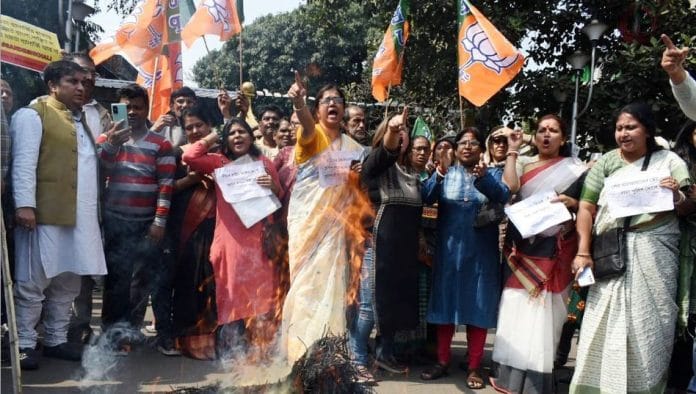The protests in Sandeshkhali area in West Bengal’s North 24 Parganas district is part of a longstanding pattern of unrest in the region. The villagers’ allegations of land grabbing and other atrocities, including claims of sexual assault, against Trinamool Congress leaders Sheikh Shahjahan, Shibaprasad Hazra, and Uttam Sardar underscore the gravity of the situation. While Hazra and Sardar have been arrested, Shahjahan remains on the run since a mob attack on a team of Enforcement Directorate officials that had arrived in early January to raid his house. Primarily, though, it is the response of the Mamata Banerjee government to the protests over police inaction on the villagers’ complaints that should concern us all.
It is difficult just yet to establish the veracity of the claims and counter-claims in the grave matter of sexual assault allegations. Parsing through the various TMC and BJP versions is difficult enough. But what we must put under scrutiny are their responses and the theatre of the absurd that West Bengal politics has become. Chief Minister Mamata Banerjee hasn’t demonstrated empathy and urgency in dealing with the allegations and is accusing the BJP of politicisation instead. The BJP, on the other hand, is turning it into a Hindu vs Muslim issue and is more interested in cornering the TMC.
The escalation of tensions into violence, marked by clashes between BJP workers and the police, emphasises the volatile state of affairs in Sandeshkhali. These incidents highlight deep-seated issues related to governance, law enforcement, and the protection of basic rights in the state.
Don’t play blame games
When allegations of gender-based violence and injustice surface, leaders must demonstrate empathy, resolve, and a commitment to justice for all affected parties. Arrests have been made and CM Banerjee has promised to take action, but by engaging in political blame games, she has also undermined the gravity of the situation. There is a need for systemic change, and the CM doesn’t quite recognise that.
Governments and law enforcement agencies need to maintain a monopoly over the use of force. It’s a fundamental principle of governance. However, it has been compromised in West Bengal as significant territories have fallen under the sway of syndicate politics. A section of TMC leaders appear to operate with impunity, shielded by their pivotal roles within the nefarious network of a warped system.
Addressing this critical issue demands decisive action from the government, both in substance and in perception. The authorities must demonstrate their commitment to upholding the rule of law by rooting out those who are complicit in undermining it. Failure to do so not only emboldens the perpetrators but also erodes public trust in the government’s ability to maintain order and justice.
The government’s first step should be to assert its authority and confront the alleged syndicate and its collaborators. This requires swift and robust enforcement actions and transparent accountability mechanisms to reassure the public that justice is being served.
It is deeply disheartening to witness the TMC, a political party that often portrays itself as progressive, liberal, and supportive of women’s empowerment, downplaying accusations of atrocities against its own cadre. The tragic case of a minor who was allegedly raped while attending a birthday party in Nadia in April 2022 highlights this disturbing trend. The victim, who died shortly after the harrowing incident, was allegedly cremated under pressure by TMC leader Samar Goala without an autopsy. The leader’s son, Braja Gopal Goala, is the prime accused in the case.
Braja was later detained by the West Bengal Police, but Banerjee’s response to reports of the 14-year-old’s rape was distressing. By questioning whether the incident should be classified as rape, and suggesting speculative scenarios such as “pregnancy” or a “love affair”, the CM disregarded the plight of the victim’s family and their need for justice.
Also read:
No Hindu- Muslim issue
The BJP’s reaction to the women’s protest will hopefully put pressure on the government to take swift action. But framing it as a Hindu versus Muslim issue for political gain is deeply problematic and counterproductive in the long run.
Portraying Hindu women as victims of Muslim men is a form of polarised politics that doesn’t lead to positive outcomes. BJP MP Locket Chatterjee compared the incident to attacks on Hindu women in Pakistan and Iraq. It is a false parallel, because Hindu, Sikh, and other non-Muslim women in Pakistan face abduction, rape, and forced conversion solely because of their religious identity. In the Sandeshkhali case, the accused are Hindus and a Muslim.
Additionally, comparing non-BJP-ruled states to Pakistan is a dangerous oversimplification that ignores India’s diverse realities and complexities. Such rhetoric only exacerbates social divisions and undermines efforts to foster unity and harmony across communities. It is important, however, to recognise that the use of inflammatory language and divisive narratives is not exclusive to any particular political party.
It is important, however, to recognise that the BJP alone cannot be accused of using inflammatory language and divisive narratives. The Opposition, too, has used terms like ‘Lynchistan’ and fascism for the BJP-led government. Both the BJP and the opposition are guilty of engaging in such tactics to cater to their vote base.
Amana Begam Ansari is a columnist and TV news panelist. She runs a weekly YouTube show called ‘India This Week by Amana and Khalid’. She tweets @Amana_Ansari. Views are personal.
(Edited by Zoya Bhatti)






